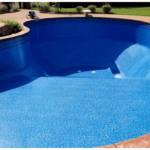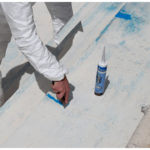Información actualizada April 7, 2024
In this article we can explore some of the most important disadvantages of fiberglass pools and offer tips on how to mitigate these problems.
In this text, we can discover a number of the most significant drawbacks of fiberglass swimming pools and offer advice on a way to mitigate these issues.
Fiberglass swimming pools have gained recognition over time because of their easy set up, sturdiness, and low-protection nature. But, there are a few hazards of fiberglass pools that you must be privy to earlier than creating a purchase.
Table of Contents
Limited design options
One of the main drawbacks of fiberglass pools is that they offer limited design options. Unlike concrete or vinyl liner pools, which can be customized to fit any shape or size, fiberglass pools come pre-molded and have limited design choices. While some manufacturers offer a few different shapes and sizes, it can be challenging to find a fiberglass pool that fits your specific needs.
Cost
Fiberglass pools can also be more expensive than other pool types. Even as the initial value of a fiberglass pool may be decrease than a concrete pool, you may turn out to be paying greater ultimately because of restrained design options and high upkeep prices.
Installation challenges
Installation of fiberglass pools can be challenging due to their size and weight. Fiberglass pools require specialized equipment to transport and install, which can increase the overall cost of installation.
Surface cracks
Fiberglass pools are susceptible to surface cracks, which can be caused by ground movement, temperature changes, or other factors. Surface cracks can be unsightly and may require expensive repairs.
Staining and discoloration
Fiberglass pools can be prone to staining and discoloration, especially if the water chemistry is not properly maintained. While staining and discoloration can be removed with the proper cleaning methods, it can be challenging to keep the pool looking new.
Limited repair options
Fiberglass pools have limited repair options. Unlike concrete or vinyl liner pools, which can be easily patched or repaired, fiberglass pools require specialized techniques and equipment to repair.
Potential for bulging or warping
Fiberglass pools can also be prone to bulging or warping. This can be caused by ground movement, improper installation, or other factors. Bulging or warping can be a significant safety concern and may require expensive repairs.
Risk of floating
Fiberglass pools can also be prone to floating, especially if the water table in your area is high. If the pool is not properly anchored, it can rise to the surface and potentially damage the pool and surrounding areas.
Difficulty with drainage
Fiberglass pools can be challenging to drain due to their shape and design. Improper drainage can lead to standing water and potential damage to the pool.
Limited size options
Fiberglass pools come in pre-molded sizes, which can limit the size options available to homeowners. if you have a selected size or shape in mind, you can need to remember a one of a kind pool type.
Chemical sensitivities
A few people can be touchy to the chemical compounds used to keep fiberglass swimming pools, that can purpose skin irritation, respiratory issues, and different health troubles.
Environmental concerns
Fiberglass pools are not as eco-friendly as other pool types. The manufacturing process of fiberglass pools requires significant energy consumption and produces greenhouse gas emissions. Additionally, if the pool needs to be replaced, the fiberglass material may not be recyclable, contributing to landfill waste.
Maintenance challenges
While fiberglass pools are generally low-maintenance, they still require regular upkeep to keep them in good condition. This includes maintaining proper water chemistry, cleaning the pool regularly, and addressing any repairs or issues that may arise.
Limited lifespan
Fiberglass pools have a limited lifespan compared to other pool types. While they can last for several decades, they may need to be replaced eventually, which can be a significant expense for homeowners.
Conclusion
While fiberglass pools offer many benefits, they also come with some significant disadvantages that potential buyers should be aware of. These include limited design options, high cost, installation challenges, surface cracks, staining and discoloration, limited repair options, potential for bulging or warping, risk of floating, difficulty with drainage, limited size options, chemical sensitivities, environmental concerns, maintenance challenges, and a limited lifespan. by using knowledge those drawbacks and taking steps to mitigate them, you can make an knowledgeable choice approximately whether or not a fiberglass pool is the right preference for you.
FAQs About Disadvantages of Fiberglass Pools
- Can surface cracks in fiberglass pools be repaired?
- Yes, but it requires specialized techniques and equipment to properly repair surface cracks in fiberglass pools.
- Are fiberglass pools more expensive than concrete pools?
- even as the preliminary value of a fiberglass pool may be decrease than a concrete pool, the confined design alternatives and high protection prices can make fiberglass swimming pools greater steeply-priced ultimately.
- Can fiberglass pools be customized to fit any shape or size?
- No, fiberglass pools come pre-molded and have limited design options compared to concrete or vinyl liner pools.
- Are fiberglass pools eco-friendly?
- The manufacturing process of fiberglass pools requires significant energy consumption and produces greenhouse gas emissions, making them less eco-friendly than other pool types.
- How long do fiberglass pools typically last?
- Fiberglass swimming pools can closing for several a long time, however they have a confined lifespan in comparison to different pool sorts and might sooner or later need to be replaced.


